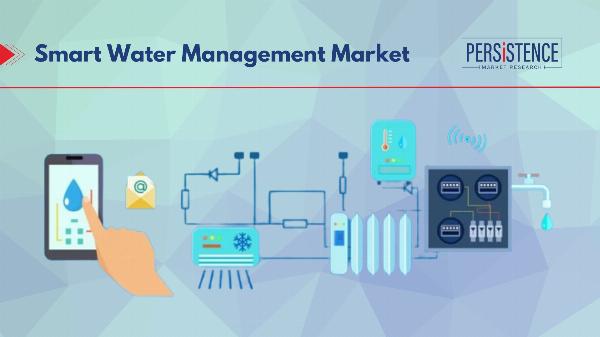Major Challenges and Solutions in the Smart Water Management Market

Strong 8k brings an ultra-HD IPTV experience to your living room and your pocket.
Introduction
Water management has always been a crucial aspect of human civilization, but with the increasing pressures of climate change, urbanization, and population growth, traditional methods are proving inadequate. The advent of smart water management systems represents a significant leap forward, leveraging technology to enhance efficiency, reduce waste, and improve sustainability. However, this market faces several challenges. Understanding these obstacles and exploring potential solutions is essential for advancing the future of water management.
The Smart Water Management (SWM) market focuses on technologies and solutions that enhance the efficiency and effectiveness of water management systems. This includes the use of sensors, data analytics, IoT, and automation to monitor and manage water resources, distribution, and consumption. The global SWM market is experiencing robust growth due to increasing water scarcity, aging infrastructure, and the need for sustainable water management practices. According to Persistence Market Research, the smart water management market is forecast to expand at a CAGR of 12.5% and thereby increase from a value of US$17.2 Bn in 2024 to US$39.2 Bn by the end of 2031.
Data Integration and Management
Challenge: One of the most significant challenges in the smart water management market is integrating and managing the vast amounts of data generated by sensors and smart devices. Modern systems collect data on water usage, quality, flow rates, and more, but aggregating and analyzing this data can be overwhelming. Inconsistent data formats, interoperability issues among different systems, and the sheer volume of data make it difficult to derive actionable insights.
Solution: To address these issues, adopting standardized data protocols and frameworks can ensure compatibility across different devices and systems. Advanced data analytics and machine learning algorithms can help process and interpret the data more effectively, providing actionable insights in real-time. Cloud-based solutions and data lakes offer scalable storage and processing capabilities, enabling more efficient data management and analysis.
High Initial Costs
Challenge: The implementation of smart water management systems involves significant upfront investment in technology, infrastructure, and training. For many municipalities and organizations, these costs can be prohibitive, particularly in regions with limited financial resources.
Solution: To mitigate the financial burden, governments and institutions can explore public-private partnerships to share costs and resources. Additionally, phased implementation strategies allow for gradual investment, starting with pilot projects that demonstrate the benefits of smart water management. Financial incentives, subsidies, and grants from governmental and non-governmental organizations can also help reduce the initial cost barriers.
Cybersecurity Risks
Challenge: As smart water management systems become increasingly connected, they are more vulnerable to cyberattacks. Data breaches, hacking attempts, and other security threats can compromise the integrity and reliability of these systems, leading to potential disruptions in water supply and quality.
Solution: Implementing robust cybersecurity measures is crucial for protecting smart water management systems. This includes encrypting data, using secure communication protocols, and regularly updating software to address vulnerabilities. Additionally, adopting a layered security approach, such as incorporating firewalls, intrusion detection systems, and regular security audits, can enhance overall system security.
Read More: https://www.persistencemarketresearch.com/market-research/smart-water-management-market.asp
Integration with Existing Infrastructure
Challenge: Many urban areas have outdated or incompatible infrastructure that can hinder the seamless integration of smart water management technologies. Retrofitting existing systems to accommodate new technologies can be complex and costly.
Solution: A strategic approach involves conducting thorough assessments of existing infrastructure to identify compatibility issues and determine the best integration methods. Modular and adaptable technologies can facilitate smoother integration with legacy systems. Investing in infrastructure upgrades in tandem with smart technology implementation can also ensure long-term efficiency and effectiveness.
Public Acceptance and Awareness
Challenge: The success of smart water management systems relies on public acceptance and engagement. There may be resistance from communities due to a lack of understanding of the benefits or concerns about privacy and data usage.
Solution: Raising public awareness through education campaigns can help build trust and acceptance. Clear communication about the benefits of smart water management, such as improved water quality, reduced costs, and enhanced sustainability, can foster positive perceptions. Engaging with the community through public forums, workshops, and informational materials can address concerns and highlight the advantages of adopting smart technologies.
Technical Skills and Expertise
Challenge: The deployment and maintenance of smart water management systems require specialized technical skills and expertise. There is often a shortage of trained personnel capable of managing and operating these advanced systems.
Solution: Investing in training and professional development programs is essential for building a skilled workforce. Collaborations between educational institutions and industry players can help develop curricula and certification programs tailored to smart water management. Additionally, leveraging partnerships with technology providers can offer technical support and resources to bridge skill gaps.
Environmental and Regulatory Compliance
Challenge: Smart water management systems must comply with a range of environmental regulations and standards. Ensuring that these systems meet legal requirements while delivering optimal performance can be challenging.
Solution: Staying informed about regulatory changes and working closely with regulatory bodies can help ensure compliance. Implementing systems that are designed with regulatory requirements in mind can streamline the compliance process. Additionally, adopting best practices and industry standards can facilitate adherence to environmental and regulatory guidelines.
Data Privacy and Ownership
Challenge: The collection and analysis of water usage data raise concerns about privacy and ownership. Users may worry about how their data is being used and who has access to it.
Solution: Establishing clear data governance policies is crucial for addressing privacy and ownership concerns. Transparent data practices, including obtaining informed consent and providing users with control over their data, can build trust. Ensuring compliance with data protection regulations, such as the General Data Protection Regulation (GDPR), is also important for safeguarding user information.
Conclusion
The smart water management market holds immense potential for transforming how we manage and conserve water resources. However, addressing the challenges of data integration, high costs, cybersecurity, infrastructure compatibility, public acceptance, technical expertise, regulatory compliance, and data privacy is essential for realizing this potential. By implementing innovative solutions and fostering collaboration among stakeholders, the industry can overcome these obstacles and pave the way for a more efficient, sustainable, and resilient water management future.
Follow Us: LinkedIn | Twitter | Instagram
Note: IndiBlogHub features both user-submitted and editorial content. We do not verify third-party contributions. Read our Disclaimer and Privacy Policyfor details.


